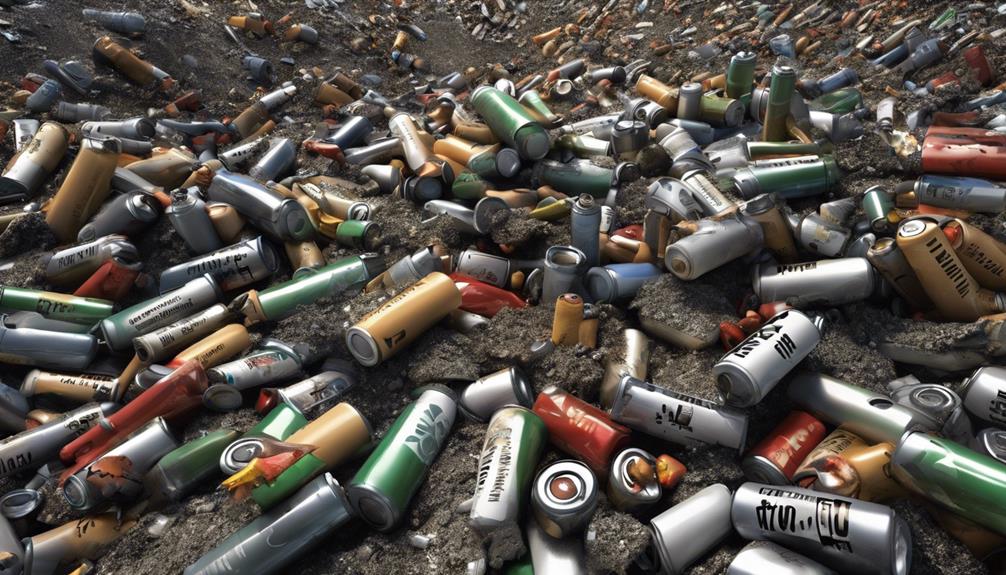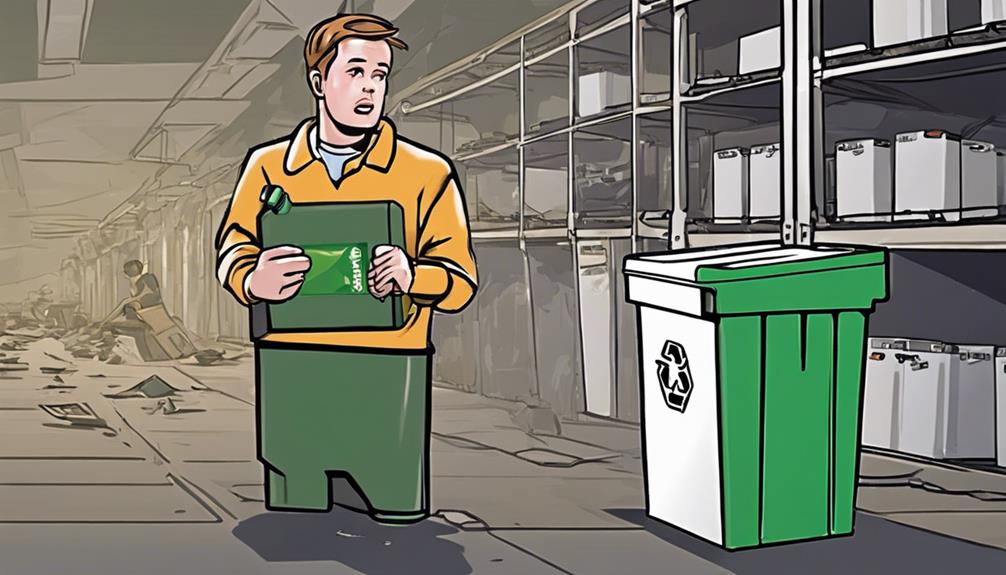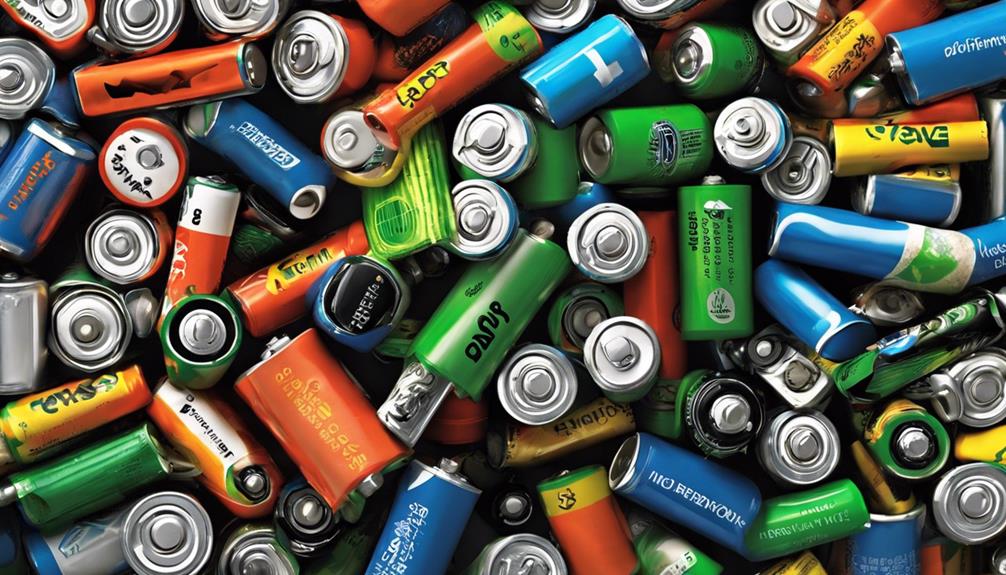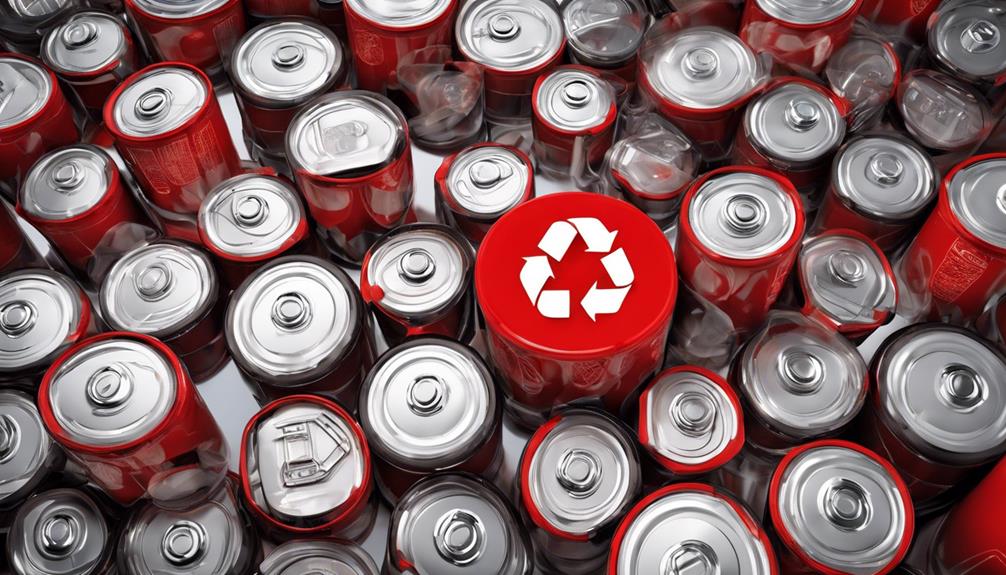As we navigate the landscape of battery disposal, we often encounter roadblocks in the form of batteries that seem to be the dead ends of recycling. How can we responsibly handle these unrecyclable powerhouses of our devices?
Let's shed light on strategies and insights that could offer a pathway towards a more sustainable approach to dealing with batteries that pose challenges in the recycling realm.
Key Takeaways
- Proper handling and disposal prevent environmental harm.
- Store and transport unrecyclable batteries safely.
- Adhere to local regulations for proper disposal.
- Repurpose non-recyclable batteries for low-drain devices.

Battery Organizer Storage Box with Tester, Battery Vault Case Fireproof Waterproof Explosionproof Holder Box with Tester BT-168 Checker Carrying Case Container Bag Fit for 200+ Batteries AA AAA C D 9V
【Fireproof Explosion Proof Waterproof】Fireproof Battery Organizer Case is made of upgraded non-itchy silicone coated fiberglass that can withstand…
As an affiliate, we earn on qualifying purchases.
As an affiliate, we earn on qualifying purchases.
Common Non-Recyclable Battery Types
When it comes to common non-recyclable battery types, identifying damaged or leaking batteries is crucial due to the safety risks they pose. Non-recyclable batteries can include those with mixed chemistries, like combining lithium and alkaline batteries, which can't be recycled together. These mixed chemistry batteries not only complicate the recycling process but can also lead to safety hazards if they leak or malfunction.
Moreover, it's essential to be cautious with non-standard batteries, such as homemade or modified batteries, as these aren't accepted for recycling due to safety concerns and the unknown chemistry involved. When handling electronic devices that contain batteries, it's important to recycle them separately from the batteries to prevent any potential risks.

EZ on the Earth – Dry Cell Battery Recycling Container – 3.5 Gallon, Battery Disposal Bin with Lid That Holds up to 41.8 lbs Batteries – Recycling Pail with Cardboard Box
UN Approved Container for Dry Cell Batteries — Easily recycle various dry cell batteries such as Alkaline, Nickel…
As an affiliate, we earn on qualifying purchases.
As an affiliate, we earn on qualifying purchases.
Environmental Impact of Unrecycled Batteries

Unrecycled batteries pose a significant threat to the environment by contaminating groundwater and ecosystems with toxic chemicals such as mercury, lead, cadmium, and nickel. Improper disposal of batteries can lead to hazardous waste seeping into the ground and water sources, causing long-lasting damage to the ecosystem. The environmental impact of unrecycled batteries goes beyond contamination and extends to the risk of fires and explosions due to the reactive materials present in these batteries.
3 Key Points:
- Proper Disposal Methods: Ensuring batteries are disposed of correctly is crucial to prevent the release of toxic substances that can harm the environment.
- Recycling Initiatives: Recycling batteries reduces the amount of hazardous waste that ends up in landfills, contributing to a cleaner environment.
- Preventing Groundwater Contamination: By recycling batteries, we can significantly reduce the risk of groundwater contamination, protecting both human health and ecosystems.

NOCO Snap-Top BG31 Battery Box, Group 24-31 12V Battery Box for Marine, Automotive, RV, Boat, Camper and Travel Trailer Batteries
Introducing the All-New SnapTop Battery Box – Similar to the HM318BK, only better. We reimagined our battery boxes…
As an affiliate, we earn on qualifying purchases.
As an affiliate, we earn on qualifying purchases.
Proper Storage of Unrecyclable Batteries
To ensure the safe storage of unrecyclable batteries, it is essential to follow proper guidelines such as storing them in a cool, dry place away from direct sunlight. Keeping unrecyclable batteries in their original packaging or separate compartments can prevent short-circuiting. Placing these batteries in a plastic container will help contain any leaks or spills. It's crucial to avoid mixing different types of unrecyclable batteries to prevent potential chemical reactions. Lastly, labeling the storage container clearly as 'Used Batteries – Do Not Recycle' is important for safety and proper disposal.
| Storage Guidelines for Unrecyclable Batteries |
|---|
| Store in a cool, dry place away from sunlight |
| Keep in original packaging or separate compartments to prevent short-circuiting |
| Place in a plastic container to contain leaks |
| Avoid mixing different types to prevent chemical reactions |
| Label container as 'Used Batteries – Do Not Recycle' |

Trojan T105-AES 6V Superior Deep Cycling VRLA AGM Batteries, Maroon, Pack of 4
As an affiliate, we earn on qualifying purchases.
As an affiliate, we earn on qualifying purchases.
Local Regulations on Battery Disposal

Local regulations on battery disposal can significantly impact how individuals must handle and discard their used batteries. It's crucial to understand the battery disposal regulations in your locality to avoid improper battery disposal and prevent environmental harm. Here are some key points to consider:
- Variation in Regulations: Local guidelines on battery disposal vary by state and city. Some areas may have specific rules for disposing of different types of batteries, such as alkaline, lithium-ion, or lead-acid batteries.
- Restrictions on Disposal Methods: Certain locations may prohibit throwing batteries in the trash due to environmental concerns. To comply with these regulations, individuals may need to use designated drop-off locations or recycling centers for their used batteries.
- Consult Local Authorities: It's essential to check with local waste management authorities to understand the specific guidelines on battery disposal in your area. By following these regulations, you can contribute to the proper management of battery waste and protect the environment.
Safe Handling and Transport Guidelines
When dealing with batteries that can't be recycled, it's crucial to prioritize safety measures such as wearing gloves to shield against corrosive materials.
Securely transporting these batteries in a non-conductive container is essential to prevent leaks or short-circuiting.
Additionally, storing non-recyclable batteries away from heat sources and flammable items is vital to minimize fire risks.
Handling Safety Measures
Regularly wearing gloves when handling non-recyclable batteries is crucial to prevent direct exposure to toxic chemicals. To ensure safe handling of these batteries, follow these safety measures:
- Use a Non-Conductive Container: Place non-recyclable batteries in a non-conductive, secure container to prevent any accidental discharge or short-circuiting during transport.
- Avoid Mixing: It's important not to mix non-recyclable batteries with recyclable ones to avoid contamination and potential hazards.
- Proper Storage: Store non-recyclable batteries in a cool, dry place away from flammable materials to reduce the risk of fire or other safety incidents.
Proper Transportation Methods
To ensure the safe handling and transport of non-recyclable batteries, it's essential to follow proper guidelines and precautions to minimize potential risks and hazards.
Always transport batteries in secure containers or their original packaging to prevent short-circuiting or leaks. When dealing with damaged batteries, use caution to avoid skin contact or inhaling harmful chemicals.
Secure batteries during transport to prevent movement or damage that could lead to safety hazards. It's crucial to keep batteries away from heat sources and flammable materials to reduce the risk of fire or explosion while in transit.
Different types of batteries, like lithium-ion or lead-acid, may have specific transportation guidelines that need to be followed for safe handling and compliance with regulations.
Storage Precautions to Take
For the safe storage and transport of non-recyclable batteries, it's crucial to segregate them from recyclable batteries to prevent potential contamination risks.
Here are three essential precautions to take when handling non-recyclable batteries:
- Store Separately: Keep non-recyclable batteries in a designated area away from recyclable ones to avoid any cross-contamination.
- Cool and Dry Storage: Store non-recyclable batteries in a cool, dry place, shielded from direct sunlight to maintain their integrity.
- Secure Transport: When moving non-recyclable batteries, use their original packaging or a secure container to prevent damage and potential leakage during transportation.
Following these storage precautions won't only ensure the safety of handling non-recyclable batteries but also help in minimizing environmental risks associated with their disposal.
Alternative Uses for Non-Recyclable Batteries

Consider repurposing non-recyclable batteries for low-drain devices to prolong their functionality and minimize waste. Instead of tossing them out immediately, give these batteries a second life by using them in gadgets that do not require high power output. Here are some practical ways to upcycle non-recyclable batteries:
| Device | Examples |
|---|---|
| Remote Controls | TV remotes, air conditioner remotes |
| Wall Clocks | Analog or digital clocks |
| LED Candles & Decorative Lights | Mood lighting, holiday decorations |
| Children's Toys | Small toys, toy cars, dolls |
| Emergency Flashlights | Power outage lights, camping lanterns |
| DIY Projects | Small robotics, crafts, educational kits |
Disposal Options for Non-Recyclable Batteries

Repurposing non-recyclable batteries for low-drain devices can extend their functionality and reduce waste, but when these batteries reach the end of their usable life, it's crucial to consider proper disposal options to prevent environmental harm.
Here are some disposal options for non-recyclable batteries based on local regulations:
- Trash Disposal: In many areas, non-recyclable batteries such as non-rechargeable alkaline batteries can be safely disposed of in the regular trash. Following local guidelines for trash disposal ensures that these batteries are handled properly.
- Special Collection Programs: Some localities offer special collection programs for non-recyclable batteries. These programs may provide designated drop-off locations or collection events where you can safely dispose of these batteries.
- Hazardous Waste Facilities: Non-recyclable batteries can sometimes be disposed of at hazardous waste facilities. These facilities are equipped to handle various types of hazardous materials, ensuring proper disposal according to regulations.
It's crucial not to mix non-recyclable batteries with recyclable ones during disposal to prevent contamination and environmental harm. Remember to seal the batteries properly before disposal to avoid leaks or damage.
Future Innovations in Battery Recycling

Innovative advancements in battery recycling are revolutionizing the way we handle and recover valuable materials from used batteries. Advanced sorting technologies are being developed to efficiently separate different battery types, leading to increased recycling rates. These advancements aim to recover essential materials such as cobalt and lithium, reducing the reliance on mining for these resources. Research in battery recycling is also focused on creating more sustainable processes to manage the growing volume of used batteries effectively. By exploring improved methods for dismantling and processing batteries, we can minimize the environmental impact of their disposal. Collaboration between industry, government, and research institutions plays a crucial role in driving these advancements in battery recycling technology.
| Benefits of Future Battery Recycling Innovations |
|---|
| Efficient sorting of battery types |
| Increased recycling rates |
| Recovery of valuable materials like cobalt and lithium |
| Sustainable processes for handling used batteries |
| Reduced environmental impact of battery disposal |
Frequently Asked Questions
What Batteries Cannot Be Recycled?
Sure thing!
Some batteries that can't be recycled include lithium-ion batteries, lead-acid batteries, and non-rechargeable alkaline batteries like AA, AAA, and 9-volt batteries. It's crucial to dispose of these batteries properly to avoid environmental harm.
When dealing with mixed or damaged batteries, caution is advised. Check with local recycling facilities or hazardous waste disposal sites for guidance on how to handle batteries that can't be recycled.
Can All Types of Batteries Be Recycled and How?
Yes, not all types of batteries can be recycled. Understanding which ones can't be recycled is crucial for proper disposal.
Lithium-ion batteries, for instance, pose challenges due to safety concerns and the need for specialized facilities.
Button-cell batteries contain toxic materials like mercury and must be recycled correctly.
Lead-acid batteries used in vehicles require specific processes for recovering valuable materials.
Knowing these distinctions helps in making informed decisions to protect the environment.
What Can You Do With a Broken Lithium-Ion Battery?
When facing a broken lithium-ion battery, it's imperative to act cautiously. Never attempt DIY repairs due to the risks of fire or explosion. Instead, contact professionals at a recycling center or hazardous waste disposal facility for safe handling.
Avoid exposing the damaged battery to extreme conditions like heat. Proper disposal is crucial to prevent environmental harm and ensure safety. Let's prioritize responsible actions to mitigate potential hazards effectively.
How Do You Dispose of Bulging Lithium Batteries?
When disposing of bulging lithium batteries, it's crucial to handle them with care due to potential safety risks. Avoid puncturing or tampering with them to prevent fires or explosions.
Store these batteries in a cool, dry place away from flammable materials.
Always seek professional help for safe disposal, reaching out to local waste management or specialized recycling facilities for guidance. Bulging lithium batteries may indicate internal damage, necessitating expert handling to ensure safety.
Conclusion
In conclusion, it's crucial for us to properly dispose of batteries that can't be recycled to protect our environment.
Did you know that approximately 3 billion batteries are thrown away each year in the United States alone?
By following the guidelines in this guide, we can all play a part in reducing the environmental impact of unrecycled batteries and work towards a more sustainable future.
Let's do our part and make a difference!










